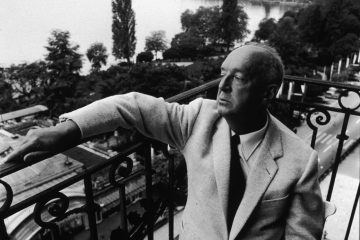Jennifer Wilson in The New Republic:
 Nabokov, who made ends meet by giving boxing lessons, assured his genteel audience there was nothing frightful in the violent punches: “I hasten to add that in such a blow, which brings on an instantaneous blackout there is nothing terrible. On the contrary. I have experienced it myself, and can attest that such a sleep is rather pleasant.”
Nabokov, who made ends meet by giving boxing lessons, assured his genteel audience there was nothing frightful in the violent punches: “I hasten to add that in such a blow, which brings on an instantaneous blackout there is nothing terrible. On the contrary. I have experienced it myself, and can attest that such a sleep is rather pleasant.”
Nabokov spent much of his writerly life sparring. He fought with readers (aggressively dividing them into the categories “good” and “bad” in his university lectures), interviewers (he refused to sit if questions were not sent to him in advance), and—of course—literary critics. The only point of criticism, he said, was that “it gives readers, including the author of the book, some information about the critic’s intelligence.” Though often pictured as a detached, professorial aesthete, cloistered away in a Swiss hotel, Nabokov was, in fact, deeply confrontational. He wrote countless letters to the editor demanding corrections (even for college newspapers) and was famously unkind in his estimation of fellow writers: Of Portnoy’s Complaint, he said, “It is a ridiculous book. It has no literary worth whatever. It is so obvious and not at all funny—a ridiculous book.” He was a frighteningly ungenerous book critic; in one of his more charitable reviews, of an anthology of Russian literature (for The New Republic), he offered this in the way of praise: “This seems to be the first Russian anthology ever published that does not affect one with the feeling of intense irritation.”
More here.
